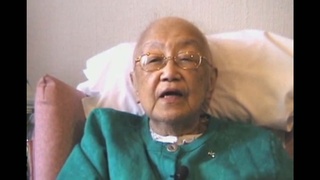FOB's
As we grew up in high school in Hawaii, I would look at Japanese from Japan and they were obviously from Japan, just by the way they dressed or carried themselves. We had a running term in Hawaii – FOB – fresh off the boat. And we would tease the FOBs amongst my close circle of friends. And I never dreamed that I’d be here.
And now when I go back to Hawaii, they say, You look FOB to me. But I think the relationships that we've developed with these people here in Japan have really shown us that they're no different than the people in America. Maybe speak a different language, maybe have some cultural differences, but experiencing the same problems in their marriages or with their kids or with their jobs and having the same struggles that Americans do.
Date: November 4, 2003
Location: Hyogo, Japan
Interviewer: Art Nomura
Contributed by: Art Nomura, Finding Home.
Explore More Videos

Identity crisis (Spanish)
(b. 1969) Former president of Centro Nikkei Argentino.

Why her parents came to Canada
(1918-2004) Interned in Slocan during World War II. Active member of the Japanese Canadian community.

Never sang Enka outside the family
(b. 1981) Enka Singer

Both Japanese and American identities though Japanese dance
(1918-2023) Nisei Japanese kabuki dancer

Family background of Fredrick Yoshihide Sasaki
(b. 1918) Issei businessman in Canada

Four sisters had international marriages (Japanese)
(b. 1937) A war bride from Yokohama


The reason to stay in Japan after his third year
Japanese American Creative designer living in Japan

Results of being more American than Japanese
(1924-2018) Researcher, Activist

Trying to convey the meaning of the songs
(b. 1981) Enka Singer

Choice to move east or go to Japan
(b.1920) Japanese Canadian Nisei. Established the Ikenobo Ikebana Society of Toronto

Internship on a Native American reservation in Arizona
(b.1952) Master drummer, artistic director of the Taiko Center of the Pacific

Different tension between East Coast and Los Angeles
Japanese American Creative designer living in Japan


A stereotype of Japanese Americans
Japanese American Creative designer living in Japan
